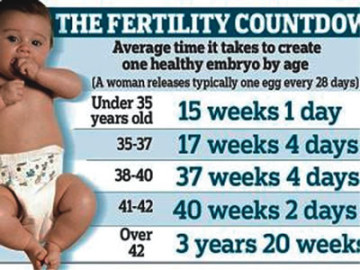The older you are, the riskier a pregnancy gets
Grace was 43 and she suddenly found herself pregnant with the fourth baby. It was completely unexpected, and she contemplated an abortion. However, her friends talked her out of it. She accepted their counselling and opted to have the baby. She nearly lost her life.
Midway into the pregnancy, she developed what the doctors called placental abruption. The placenta stuck out of her body and simply hung there. Her physician advised her to use sanitary pad until after the delivery – an additional burden for a pregnant woman, if you ask me.
Worse still, she was informed that due to her age and the turn of event, she would have to be delivered via a Caesarian Section and that her womb would be expunged alongside. Desperate to live, Grace accepted the conditions. But despite her doctor’s assurances, she was afraid for her life and that of her baby.
She did have the baby safely, though, but what happened gives an insight into the world of ageing pregnant women.
As the economy bites harder everywhere in the world, people are making all sorts of adjustments to make ends meet and to also plan for the future. As a result, many are putting off marriage till they are well established in their careers and financially confident – usually in the early/mid-30s.
While no one can tell anybody when to marry or have children, experts warn that delaying child-bearing for too long may not be wise, after all. And this goes for women and men.
But while men have the advantage of lifelong fertility, women don’t; as, experts say, pregnancy becomes a lot more elusive by the time a woman hits three-and-a-half-decades and beyond.
Gynaecologist, Dr. Tomiwa Aduwo, says the biggest obstacle for women age 35 or older may be getting pregnant in the first place. He explains, “Fertility rates begin to decline gradually at age 30, more so at 35, and markedly at age 40. Even with fertility treatments such as in-vitro fertilisation, women have more difficulty getting pregnant as they age.”
Online portal, womenshealthmag.com, notes that while most of these pregnancies go smoothly, the fact is, maternal medicine experts classify them as “high risk” because older mothers are more likely to face complications that can affect their health as well as that of their baby.
As such, if you are planning to have a baby now that you are on the other side of 30, do bear the following considerations in mind.
The American Society for Reproductive Medicine notes that a 30-year-old has a 20 per cent chance of getting pregnant per cycle, but by the time she’s 40, her odds sink to five per cent per cycle. Researchers therefore advise that if you’ve been trying for six months without luck, consult a fertility specialist.
Obstetrician/Gynaecologist and co-author of V is for Vagina, Dr. Alyssa Dweck, says many of the things that make it tougher for older ladies to conceive – such as uterine fibroids or irregular periods – can be treated.
At this age, too, physicians say, conceiving a baby with chromosomal problems is real. The National Institute of Health warns that every woman has a chance of having a baby with problems, no matter what her age. Experts say this risk goes up as you age.
They note, “If you get pregnant at age 25, your risk of having a baby with Down syndrome, for example, is about one in 1,250. At age 40, the risk is one in 100. This is because by the time you enter the late 30s, your eggs are already ‘senior citizens,’ and they don’t divide as well upon conception. That increases the odds of an embryo with chromosomal problems, which in turn may result in miscarriage or birth defects.”
Regular counseling with your physician is a must at this stage, what with the series of tests – including blood tests and full anatomy ultrasound – that will be done to check for possible genetic abnormalities.
The ageing mom-to-be has a long road to travel, if metaphorically. Physicians say even after you get pregnant, age continues to have an effect. “The older you are when you are pregnant, the more likely you are to have chronic diseases such as high blood pressure or diabetes. If they are not diagnosed, they can affect the pregnancy,” physicians enthuse.
Aduwo warns, “The ageing mom-to-be is at higher risk of developing certain complications during pregnancy, such as gestational diabetes, preeclampsia (a medical condition characterised by high blood pressure and significant amounts of protein in the urine of a pregnant woman), placental abruption (in which the placenta prematurely separates from the uterine wall), and placenta previa (in which the placenta lies low in the uterus, partly or completely covering the cervix).”
He continues, “Research also shows that the chances of having a low-birth-weight baby or a premature delivery increases with age. Some studies show that older women are more likely to be induced, and most studies show a significantly higher rate of delivery by C-Section.”
He advises women in this class to intimate their doctors with any family history of chronic conditions. He also says they must keep all scheduled prenatal appointments, so that the doctor can catch any condition before it bludgeons into high health risk.
Doctors also warn that women over age 35 are more likely to have prolonged labour lasting more than 20 hours and excessive bleeding during delivery.
And where there are no health issues for an ageing mom, researchers say, the possibility of having multiple births increases with age. And unless you have the resources or actually look forward to it, the situation can become traumatic, what with many babies to care for at a go!
The National Report on Human Exposure to Environmental Chemicals issued by the Centres for Disease Control and Prevention confirms that the chances of having multiple births increases in your late 30s, even without fertility treatments. The drawback here, experts warn, is that the more babies a woman carries per pregnancy, the greater her risk of delivering early and/or having low birth-weight pre-term babies, who may end up with lingering health issues.
PUNCH.








